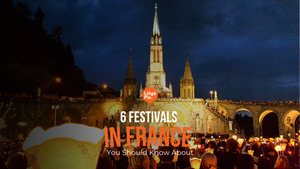When traveling to a French-speaking country, having a basic understanding of the local language can greatly enhance your experience.
Learning a few essential French travel phrases not only enables you to communicate with locals but also shows respect for their culture and makes your interactions more enjoyable.
Today, we will introduce you to 20 basic French travel phrases that are perfect for beginners. Each section will focus on a specific category of phrases, providing translations, guidance, and example usage.
We will leave you with some tips for learning French at home. Follow this guide, and you'll be speaking French in no time.

20 French Travel Phrases
Let's dive into our comprehensive list of 20+ essential French phrases so you have the tools necessary to make yourself understood in France.
We will kick things off with greetings and polite expressions so you can conduct yourself well on your trip to France.
Greetings and Polite Expressions
When interacting with locals in a French-speaking country, it's important to start with a friendly greeting.
- Bonjour - Hello
The phrase bonjour is the most common and widely used greeting in French. It sets a positive tone for your conversation. You can use this greeting all day.
- Bonsoir - Good evening
Bonne soirée - Have a good evening
Bonsoir is used in the evenings, from around 6 pm onward as a greeting. Meanwhile, bonne soirée is used to express the desire that someone else will have a nice evening. - Bonne nuit - Good night
Just as in English, you would use bonne nuit as "good night" before going to bed. - Au revoir - Goodbye
When leaving someone at any time of day, au revoir is a polite and pleasant way to say "goodbye." - Comment t'appelles-tu? - What's your name? (informal)
Comment vous appelez vous? - What's your name? (formal)
Quel est ton nom? - What is your name? (informal)
Quel est votre nom - What is your name? (formal)
Once you have greeted someone, you can ask "What is your name?" either formally or informally, as the situation dictates.
- Je m'appelle... - My name is…
- Je viens de ... - I come from...
La France - France
L'Allemagne - Germany
L'Espagne - Spain
Le Royaume-Uni - The UK
Les États-Unis - The US - (Comment) ça va? - Are you alright? (most informal)
Comment vas-tu? - How are you? (informal)
Comment allez vous? - How are you? (formal)
To show interest in someone's well-being, ask "How are you?" It's a common way to initiate a friendly conversation and display your courtesy.
You can reply to ça va? with ça va or ça va bien, both of which mean "I'm alright". Or, use je vais bien, which also means "I'm alright". - Merci - Thank you
Learning to say "thank you" in the local language wherever you go will endear the natives to you. On your trip to France, you will find yourself saying merci all the time.
For instance, with the phrase ça va bien, merci. Et toi?, meaning "I'm good, thanks. And you?"
- De rien - You're welcome
If someone thanks you in a French-speaking country, the standard reply is de rien. - S'il vous plaît - Please (formal)
S'il te plaît - Please (informal)
When asking for something in a hotel, restaurant, among friends, or in any other situation, it is always best to say "please".
As you can see, there is a more formal and less formal way to say "please". Use the informal with friends, and the formal in other social situations.
If you are ever in doubt about whether to use formal language, it is best to err on the side of caution and go for the formal structure. - Je suis désolé - I am sorry
It is always worth knowing how to say sorry if you need to apologize for anything in French, for instance not understanding something or not knowing the answer to a question. - Je ne comprends pas - I don't understand
Je ne sais pas - I don't know
Can You Speak English/ French?
With the following phrases, you can swap out anglais ("English") and français ("French") with any other language, as needed.
- Pourriez vous parler français - Could you speak French?
- Parlez vous anglais? - Do you speak English?
- Je ne parle pas français - I don't speak French
- Je parle un peu français - I speak a little French
- Parlez lentement, s'il vous plaît - Speak slowly, please
Useful French Travel Phrases
One of the most important things to learn in French is how to ask for directions. Let's look at some common questions in French regarding directions.
- Où est la plage/ le gare - Where is the beach/ the train station
You can use où est...? for any other singular object, such as la tour Eiffel ("the Eiffel Tower") and le bus ("the bus"). Just make sure to note the gender of the object so you use the right article. - Où est le guichet? - Where's the ticket booth?
Note that you can also say je cherche..., which means "I am looking for..." - Où sont les toilettes? - Where are the toilets?
- Où sommes-nous - Where are we?
As you can see, où means "where" in French. This is followed by a conjugated form of the verb "to be", être, and the object of the sentence. - Excusez moi, je suis perdu - Excuse me, I am lost
Finally, a handy phrase to know is "excuse me, I am lost". It's a good idea to keep a copy of your hotel information on your person so you can show people if you need help directing yourself home.
Miscellaneous Common French Phrases
Now that you have learned 20 French phrases for travel, we will list some other miscellaneous French phrases for everyday life in a French-speaking country.
- Je t'aime - I love you
You will come across je t'aime in music, movies, and even on t-shirts, so it is worth knowing what it means. And you never know - you might want to use this French phrase yourself when you get to Paris, the city of love. - Es-tu célibataire? - Are you single?
- Je ne sais quoi - I don't know what
Paris is known as a romantic destination as it has a certain je ne sais quoi in the air that makes it so unique and magical. - Je voudrais (un café) - I would like (a coffee)
- Un verre de vin - A glass of wine
When in France, you will want to get your hands on a coffee or a wine as soon as you find the right spot to sit and people-watch. - Je voudrais acheter... - I would like to buy…
- Combien ça coûte - How much does it cost?
- C'est trop cher - It's too expensive
Asking a question in French
Finally, a note on forming a French question. In general, to ask a simple question in French, you can use est-ce que.
Take a look at the following basic French phrases.
- Est-ce que vous parlez français? - Do you speak French?
- Est-ce qu’il parle français? - Does he speak French?
- Est-ce qu’elle parle français? - Does she speak French?
How to Learn French at Home
So, now that you have this useful vocabulary list to get you started, you will want to know how to start learning French at home. One great method is to watch French TV shows and movies.
This provides natural exposure to French slang and colloquialisms, idiomatic phrases, the French accent, and French culture. You can find great French shows on Netflix and Lingopie.
Both streaming services offer French and English subtitles, and Lingopie has bonus language-learning features like digital flashcards and an interactive transcript.
You can also listen to French podcasts and French songs like La Vie en Rose and Je ne Regrette Rien. Any engaging resource that familiarizes you with French pronunciation and introduces you to new French words in a natural way is a great language tool.
Of course, you can also sign up for online French classes or find a private tutor. Many language learners also enjoy using language-learning apps to supplement their learning. You can also buy a French phrasebook if you want to have all of your useful French phrases in one place.,
FAQs About French Phrases for Travelers
Now, let's take a quick look at some frequently asked questions about basic French phrases for travel.
Is there another way to ask "où sont les toilettes?"
Yes, there is another way to ask où sont les toilettes? which means "Where are the toilets?" You can also say où est la salle de bain?, which means "Where is the bathroom?"
Both are appropriate in public and formal situations.
Is it rude to say "je ne comprends pas" in French?
No, it is not rude to say "I don't understand" in French. You can make the statement more polite by saying je suis désolé(e), je ne comprends pas, meaning "I'm sorry, I don't understand".
You might want to add répétez s'il vous plaît, meaning "can you repeat, please", or je ne parle pas français, "I don't speak French."
How do you say "s'il vous plaît" informally?
The phrase s'il vous plaît ("please") literally translates as "if it pleases you", but it is used like "please" in English. You can say "please" informally in French by switching out the vous ("you" - formal) for te ("you" - informal). So, it sounds like s'il te plaît.

Summing Up: Basic French Travel Phrases
Now that you have started to learn these 20+ basic French words and phrases, you are ready to dive into the French language and start practicing today.
Whether you're asking for directions, ordering food, or engaging in basic social interactions, these phrases will serve as a valuable tool during your journey.
French learners can head over to Lingopie's streaming site for access to a host of awesome French TV shows and movies with interactive learning features.
Your language-learning journey starts today with the help of Lingopie and this comprehensive vocab guide. Have fun learning French at home.









